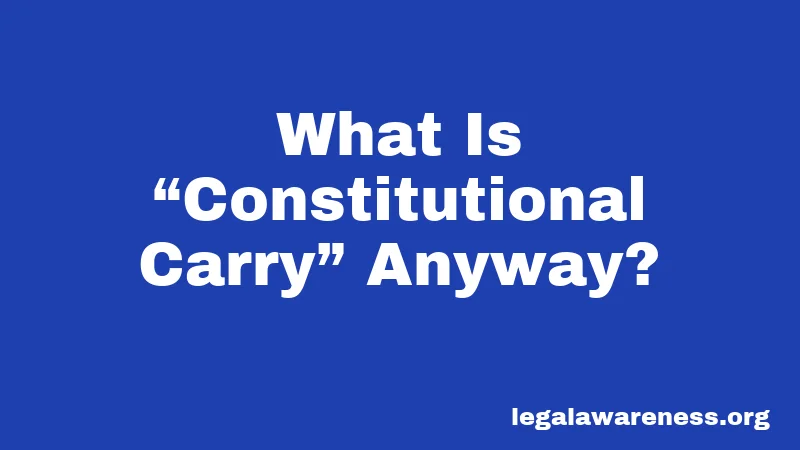Indiana Gun Laws in 2026: What You Actually Need to Know
Most people have no idea Indiana’s gun laws changed so dramatically. Seriously. But they did, and the penalties for breaking them can be surprisingly harsh. Let’s break down exactly what you need to know to stay legal and protected.
Indiana used to require permits for carrying handguns. Not anymore. As of July 2022, the state became what’s called a “constitutional carry” state. This sounds simple, but there’s way more to it. You need to know what you can and cannot do.
What Is “Constitutional Carry” Anyway?

Think of constitutional carry like this: the government stepped back from deciding who gets to carry a gun. If you’re a legal adult and not prohibited by law, you can carry. No permit needed.
This is actually a big deal. Under the Indiana constitutional carry law effective in July 2022, if you are over 18 and do not have a felony conviction, you do not need a permit to carry.
But here’s where people get confused. No permit required doesn’t mean no rules. Trust me, Indiana has plenty of rules.
The Basics: Who Can Carry a Gun in Indiana?
You can carry without a permit if you’re 18 or older and don’t fall into certain prohibited categories. Wondering what counts as “prohibited”? Let me break that down for you.
You cannot carry if you have been convicted of a serious violent felony. These include murder, manslaughter, kidnapping, rape, robbery, and aggravated battery. The state takes these crimes seriously. Getting caught with a gun after one of these convictions is a huge legal problem.
You also can’t carry if you were convicted of domestic battery. Even a misdemeanor conviction counts. This applies to anyone accused of hurting or threatening an intimate partner or family member. The law is strict about keeping guns away from people with a history of violence at home.
Other disqualifications include being under a court order of protection, having been declared a danger to yourself or others, fleeing from a court, or having a dishonorable discharge from the military. It’s more complicated than most people think.
Federal law adds even more restrictions. If you’ve been convicted of any felony punishable by more than one year in prison, federal law says you can’t own a gun. This is a hard rule. Indiana state law might be lighter, but federal law always wins.
Purchasing a Gun in Indiana

Okay, pause. This part is important for anyone planning to buy.
You must be 18 to buy a rifle or shotgun from a dealer. For handguns, you must be 21. There’s no way around this. If you’re between 18 and 20 and want a handgun, you’ll have to wait.
The dealer will run a background check. The system checks federal records and state records. It looks for felony convictions, restraining orders, domestic violence convictions, and other disqualifying factors. If something shows up, the sale gets denied.
Pretty straightforward, right? Yep, that’s all you need to know for the purchase part.
Where You Absolutely Cannot Carry a Gun
Not sure what counts as a gun-free zone? Let me list the big ones.
You cannot carry on K-12 school property or school buses. This is the toughest restriction. There’s one small exception: you can have a gun locked in your vehicle on school property if it’s out of sight. But that gun better be secured. Getting caught with a gun visible near a school? That’s a felony.
Courthouses and any building that contains a courtroom are off-limits. Government buildings are prohibited. Airports and airplane boarding areas are federal restrictions. The Indiana State Fair and riverboat casinos also ban firearms.
One more thing. Private businesses can post signs saying no guns allowed. Here’s where it gets tricky. The sign itself has no legal force. But if the owner asks you to leave and you refuse, that’s trespassing. Basically, respect the property owner’s wishes.
Castle Doctrine: Your Right to Defend Your Home

Indiana recognizes what’s called the Castle Doctrine. Honest, this law makes sense.
This means you have the right to use deadly force if someone breaks into your home or car without permission. You don’t have a duty to run away first. You can stand your ground and defend yourself.
The law is simple. If someone breaks in, you can use whatever force is necessary to stop them. You’re protected from civil liability if you act reasonably.
Recent Changes You Need to Know About
Hold on, it gets better. Indiana is actively working on new gun legislation for 2026.
Senate Bill 130 is making headlines. If a child or dependent in a household would use their parent or guardian’s gun to hurt or kill another person, the bill says that parent or guardian can be charged with a level 6 or 5 felony for failing to properly secure that weapon. This is basically a gun storage law. It’s aimed at making sure guns don’t fall into kids’ hands.
Senate Bill 62 would change how children are charged with gun crimes, whether in juvenile or adult court. It would increase the penalties for gun crimes committed by children on or near school properties and on school buses. This one’s targeting juvenile gun crimes. The state is getting tougher on minors with guns.
These aren’t finalized yet, but they’re coming. Stay with me here because these changes could affect you.
The Penalties: What Happens If You Break the Law
Most people don’t realize how harsh these penalties actually are.
Carrying a handgun without being eligible to carry it is a Class A Misdemeanor. That means up to one year in jail and fines up to $5,000. Not fun, but it gets worse.
If you carry a gun on school property or within 500 feet of a school, the charge jumps to a Level 5 Felony. Level 5 Felonies carry 1 to 6 years in prison and fines up to $10,000. Think of it like a traffic ticket, but with federal prison involved.
Being a felon in possession of a firearm is a Level 4 Felony. This carries 2 to 12 years in prison and fines up to $10,000. If you have a serious violent felony conviction and someone finds you with a gun, you’re looking at serious prison time.
Pointing a loaded gun at someone is a Level 6 Felony. That’s up to 2.5 years in prison and $10,000 in fines. Pointing an unloaded gun is a Class A Misdemeanor. Either way, it’s not worth it.
Selling or transferring a gun to someone you know can’t legally have one is also a Level 5 Felony. Up to 6 years in prison. The state really doesn’t want people helping prohibited persons get guns.
Felon Gun Rights: Can They Be Restored?
Here’s something that confuses a lot of people.
Federal law prohibits most felons from owning guns permanently. But Indiana has a pathway. In the state of Indiana, most felons are not considered a “proper person;” the standard used to determine who can and cannot purchase and possess a firearm. However, felons whose convictions are NOT for domestic violence may be able to become a “proper person” by petitioning to have their felony conviction(s) expunged.
If your felony is expunged from your record, federal law says you can own a gun again. But this process is complicated and takes time. You need a lawyer for this.
For domestic battery convictions, it’s harder. Expungement will not restore gun rights for those convicted of a crime considered to be one of domestic violence. However, those impacted may be able to petition the court for a restoration of their gun rights in Indiana. You have to wait five years after your conviction and file a petition with the court. It’s possible, but not automatic.
Getting an Optional License to Carry
You don’t need a permit anymore, but getting one is still an option. Some people want one for reciprocity with other states.
The optional License to Carry a Handgun (LTCH) comes in two versions: 5-year and lifetime. As of July 2021, lifetime licenses are completely free. Five-year licenses also have no state fee.
You’ll need to get your fingerprints taken electronically. The process is quick and simple. The Indiana State Police will conduct the necessary checks to determine if you are a proper person under Indiana statute. Everything happens online through their portal.
Why would you want a permit if it’s not required? Because Indiana residents can take that license to other states that recognize it. If you travel with a gun, the LTCH is helpful.
Transporting Guns in Your Vehicle
Got questions about driving with a gun? This one’s actually pretty simple.
You can transport a firearm in your vehicle. There’s no requirement that it be unloaded. But common sense matters here. If your gun is loaded and easily accessible, you’re creating problems.
When you’re driving through an area where you can’t legally carry, transport your gun unloaded. Store it out of reach. Better safe than sorry.
Red Flag Laws and Dangerous Person Orders
Stay with me. This part is important because it affects you even if you’ve never broken a law.
Indiana allows law enforcement and family members to petition a court to temporarily take someone’s guns away if they’re a danger to themselves or others. The police may temporarily confiscate firearms from people who are threatening to harm themselves or others. No warrant or judge’s signature is necessary.
Law enforcement has to submit a written statement explaining why they think you’re dangerous. You get to respond at a hearing. Within 14 days a judge must agree that probable cause exists, or the person’s guns must be returned.
If the judge agrees you’re dangerous, your guns get taken and you can’t possess any new ones while the order is in place. It’s temporary, but it’s serious. This is meant to prevent suicides and violence.
Private Property and Business Rights
Here’s where it gets interesting.
Employers can’t fire you for having a gun locked in your car at work. That’s Indiana law. But employers can set rules about firearms in buildings or on company property.
Private businesses can prohibit guns. But remember—signs have no legal force. The actual rule is that if the owner asks you to leave and you don’t, you’re trespassing.
This balance between gun rights and property rights is something Indiana tries to manage. Stay on the owner’s good side.
Special Situations: What About Hunting and Target Shooting?
You’re not alone, this confuses a lot of people.
Hunting requires a separate hunting license from the Indiana Department of Natural Resources. Gun laws and hunting laws overlap sometimes. Know your hunting season and where you’re allowed to hunt.
Target shooting at indoor ranges should be fine. But read the range’s rules. Some ranges have their own restrictions beyond state law. Outdoor ranges might have zoning restrictions.
If you’re using a gun for hunting or shooting, you’re still subject to all the laws we’ve talked about. Just because you’re hunting doesn’t mean you can carry in a gun-free zone.
What About Exotic Weapons and Suppressors?
Interesting question. Indiana actually gives a lot of freedom here.
Switchblades and automatic knives are legal in Indiana since 2013. Throwing stars were also legalized in 2023. But some locations still restrict them—like schools and courthouses. The same rules apply.
Suppressors? The U.S. House of Representatives passed H.R.1 the One Big Beautiful Bill Act, which included Section 2 of the Hearing Protection Act, completely removing suppressors from the National Firearms Act. This federal change is brand new for 2025. Indiana law is likely to reflect this change. But check current regulations before purchasing.
Frequently Asked Questions
Can I carry a gun without a permit in Indiana? Yes, if you’re 18 or older and not prohibited by law. You don’t need a permit for constitutional carry.
What happens if I’m caught carrying illegally? It depends on where and why. Minimum is a Class A Misdemeanor with up to one year in jail. School property makes it a felony.
Can I restore my gun rights after a felony? Maybe. Non-violent felons can petition for expungement. Once expunged, federal law lets you own guns again. But it takes time and a lawyer.
Can a property owner stop me from carrying in their business? Yes. Private property owners control their own property. If asked to leave, you must leave or face trespassing charges.
What’s the difference between open and concealed carry? In Indiana, there’s no difference anymore. Constitutional carry lets you do either without a permit. Both are totally legal.
Final Thoughts
Indiana’s gun laws got a lot more relaxed starting in 2022. But “relaxed” doesn’t mean “no rules.” You can carry a gun without a permit. That’s huge. But you still can’t carry in schools, courthouses, airports, or other protected locations.
The penalties for breaking these laws are serious. Prison time and massive fines are real consequences. New legislation in 2026 might add more restrictions around gun storage and minors with guns.
Here’s the bottom line: Indiana is a gun-friendly state. If you’re legally allowed to own a firearm, the state trusts you. But the state also expects you to follow the rules. Know where you can’t carry. Understand who can’t legally have a gun. And if you have questions, ask a lawyer.
Stay informed, stay safe, and when in doubt, look it up or ask an attorney.
